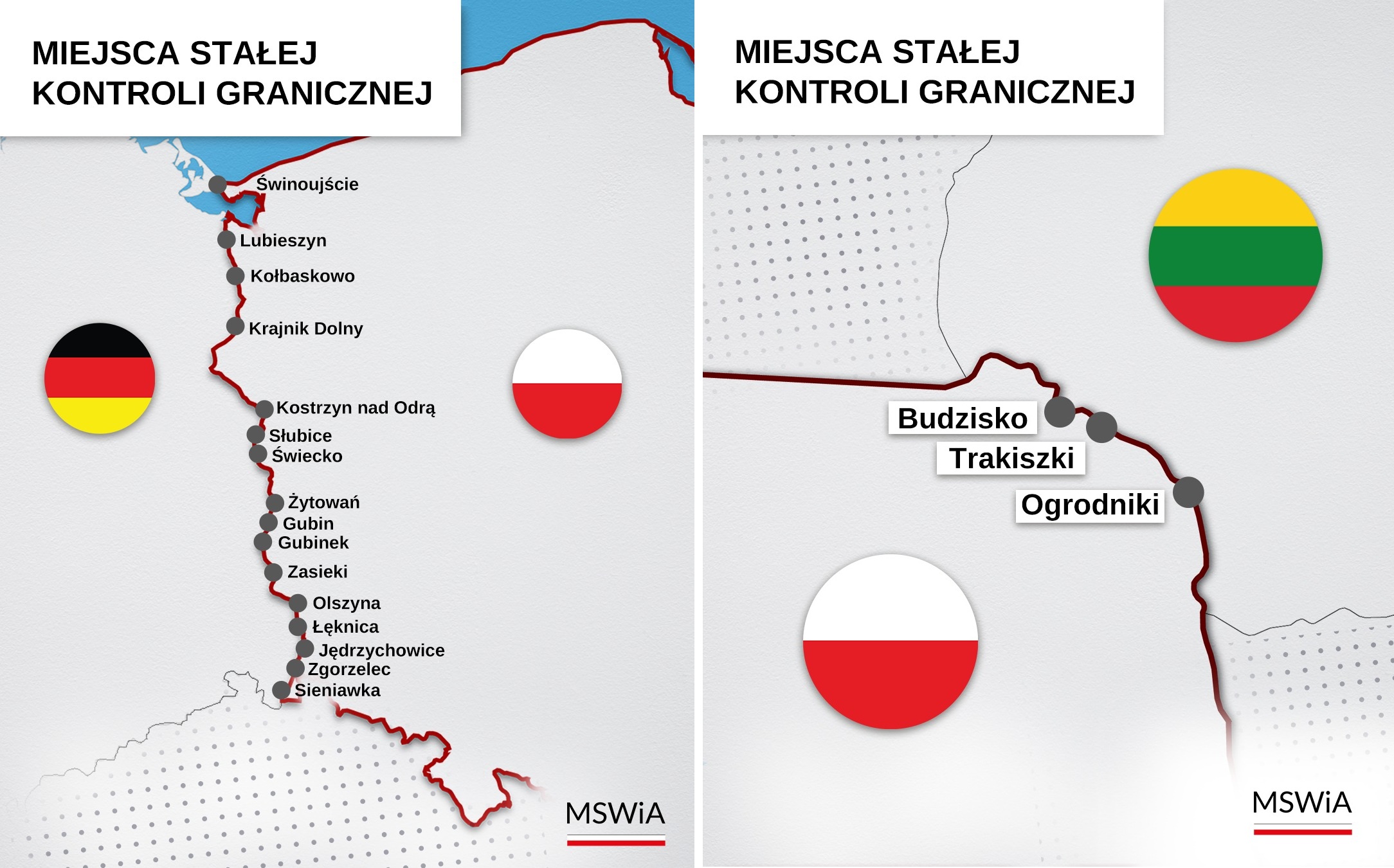Poland reintroduces controls on borders with Germany and Lithuania

Poland reintroduced controls on its borders with Germany and Lithuania at midnight between 6 and 7 July. Minutes later, officers announced that they had detained a car transporting four irregular migrants, likely to be from Afghanistan.
Prime Minister Donald Tusk announced the border controls last week in response to growing domestic pressure, in particular over Germany’s policy of returning to Poland hundreds of migrants each month who crossed the border unlawfully.
Meanwhile, the Lithuanian border is used by migrants who irregularly enter Latvia and Lithuania from Belarus before heading westwards through Poland.
Pierwsze minuty tymczasowego przywrócenia kontroli granicznej na granicy z Niemcami 🇩🇪 w Kołbaskowie. Funkcjonariuszy Straży Granicznej wspiera @PolskaPolicja💪🏻#BezpiecznaGranica pic.twitter.com/XjYtBr9jpd
— Straż Graniczna (@Straz_Graniczna) July 6, 2025
At midnight, checkpoints were established at 52 places on the German border: 41 road crossings, including for pedestrians and cyclists; eight railways crossings; and three river crossings. A further 13 were set up on the Lithuanian border (one rail, 12 road).
Sixteen of the crossing points with Germany and three with Lithuania have been designated as places where constant checks will take place, with border guard officers permanently present.
In normal times, as members of the Schengen free-travel zone, Germany, Lithuania and Poland do not operate controls on their shared borders. However, countries within Schengen are permitted to reintroduce controls in emergency situations if they are temporary and “a last resort measure”.

Permanent checkpoints established by Poland on the German and Lithuanian borders (source: Polish interior ministry)
The Polish interior ministry says that “only selected individuals and vehicles entering Poland will be checked, without unnecessarily disrupting border traffic”. In particular, vehicles with large numbers of passengers and those with tinted windows are likely to be stopped.
At just four minutes after midnight, the Polish border guard posted pictures showing a car that had been stopped at the Lithuanian border, driven by “an Estonian citizen transporting four illegal migrants, likely Afghan nationals”.
However, a border guard spokesman, Michał Bura, told broadcaster Polsat that the car had actually been stopped just before the official controls began at midnight.
🟢TERAZ❗️
Granica z Litwą 🇱🇹. Zatrzymany obywatel Estonii przewożący 4 nielegalnych migrantów, prawdopodobnie obywateli Afganistanu. Trwają czynności❗️#BezpiecznaGranica pic.twitter.com/16WGjYSnjz
— Straż Graniczna (@Straz_Graniczna) July 6, 2025
Reporting from the German border, broadcaster TVN said that Polish officers “are stopping almost every car” entering the country. In 2023, Germany also reintroduced such controls on its side of the border for those entering from Poland, and they have remained in place ever since.
Berlin’s decision has resulted in hundreds of migrants being turned away at the border every month, while others are also deported to Poland from Germany if it is established that they entered unlawfully.
Poland’s right-wing opposition has criticised the government for allowing those returns to take place, although they also occurred – often at a similar or even higher rate – under the previous rule of the national-conservative Law and Justice (PiS) party that is now the main opposition.
Meanwhile, self-declared “citizen patrols” have also formed on the Polish side of the German border, seeking to monitor and prevent returns of migrants.
Official data show that Germany is sending hundreds of migrants back to Poland every month.
However, the figures also indicate that returns are being carried out at a lower rate this year than in the recent past https://t.co/9R1504gz9g
— Notes from Poland 🇵🇱 (@notesfrompoland) July 5, 2025
Poland’s border controls are initially in place for 30 days, though that period can be extended. The interior ministry revealed that 800 border guard officers would be working at the new checkpoints, supported by 500 territorial soldiers, 300 police officers and 200 military police.
The introduction of checks has caused concern about difficulties for people living in border areas, who often cross to Germany and Lithuania for work, to visit family, or for other reasons. The Polish interior ministry says it will do everything to ensure the checks cause “as little difficulty as possible” for residents.
“We are fighting against illegal migration. This is not aimed against Polish, Lithuanian, German – or any other – citizens who travel honestly and cross borders legally,” said Polish interior minister Tomasz Siemoniak on Sunday.
Main image credit: MSWiA/X
notesfrompoland





